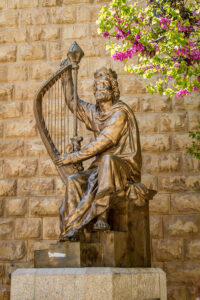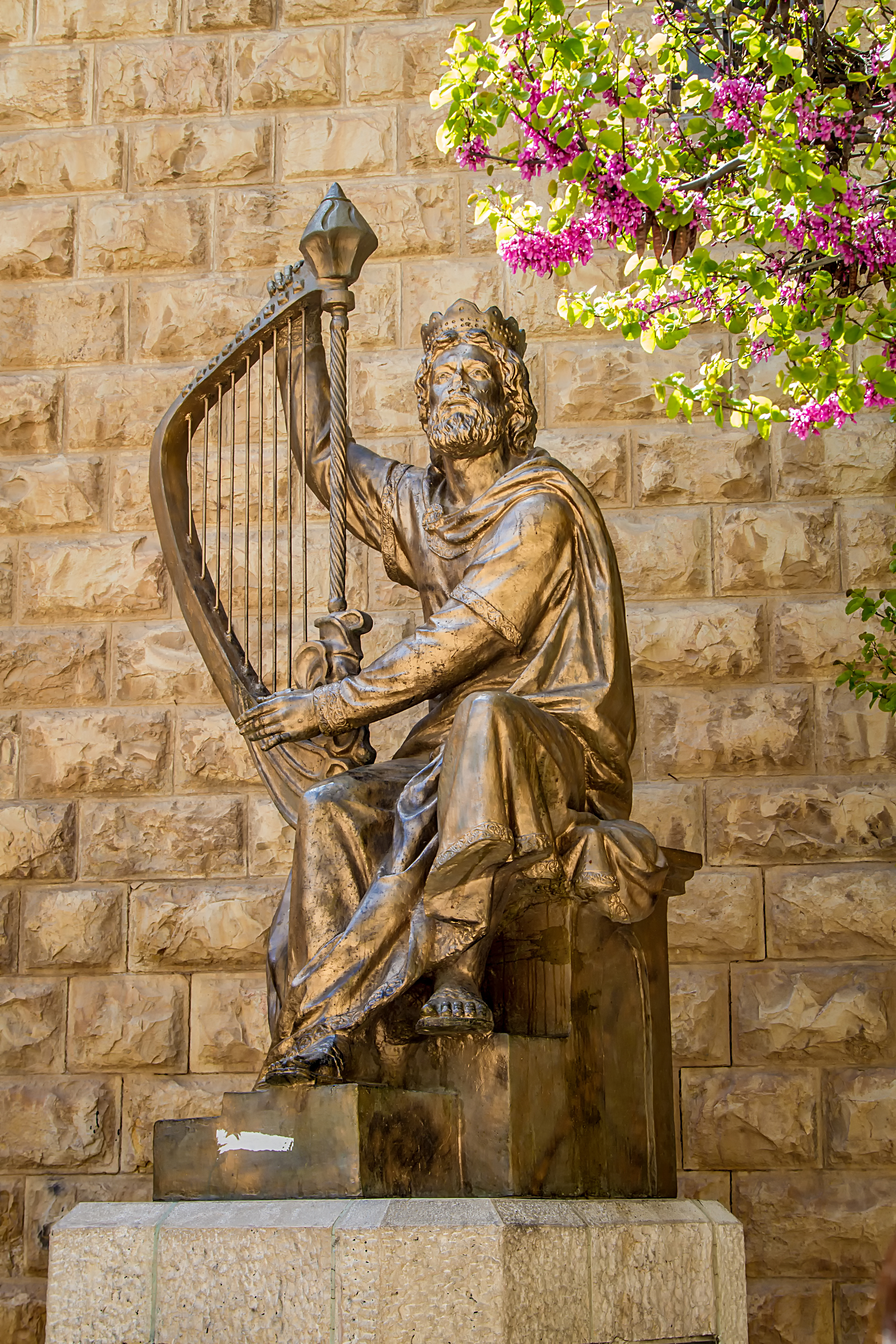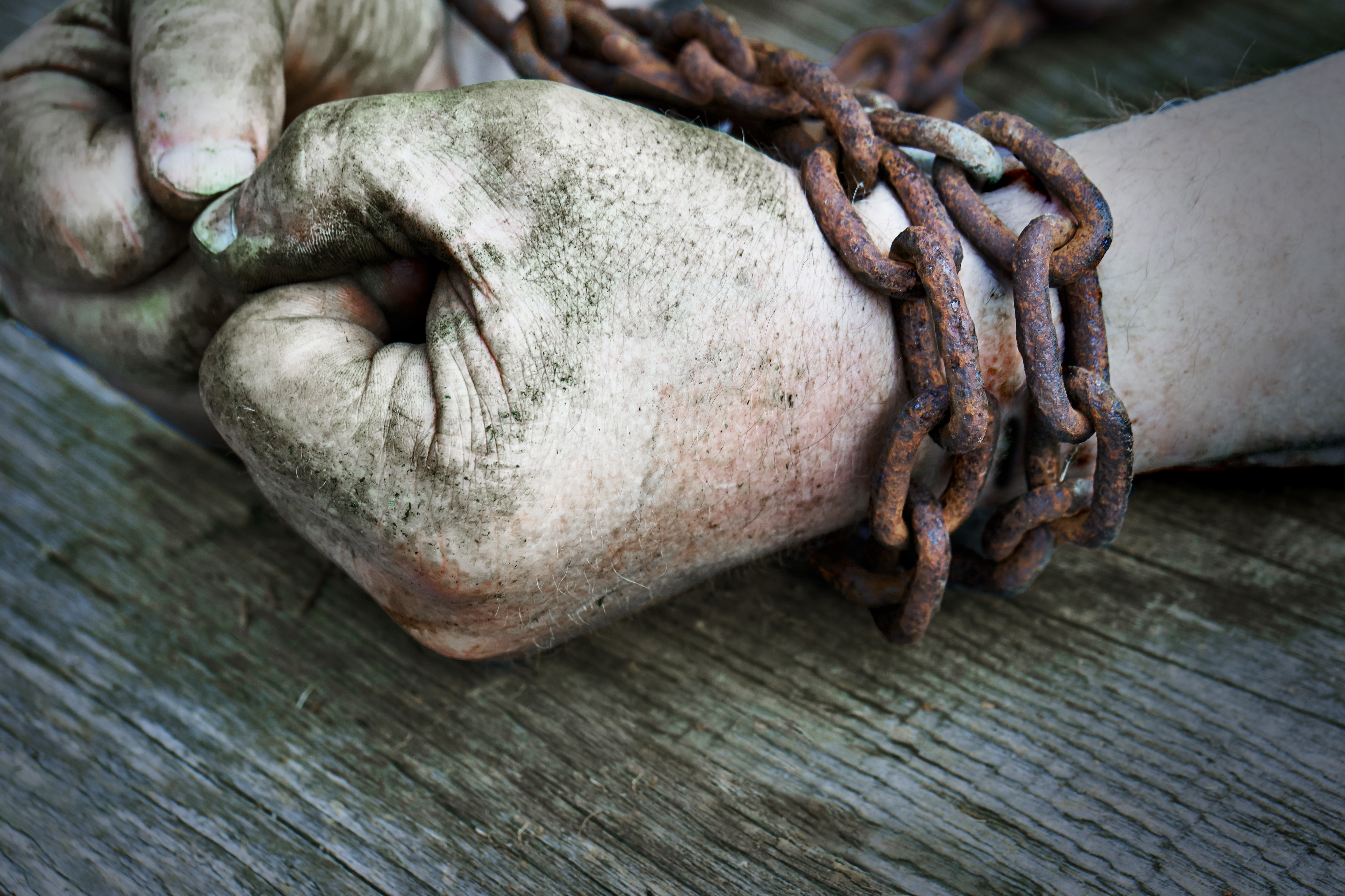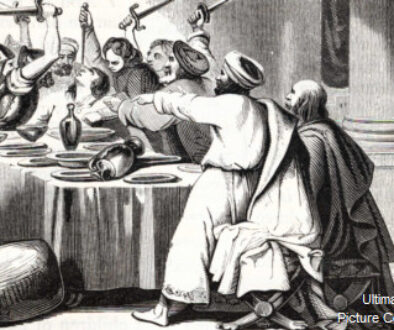2 Samuel 23 David’s Eulogy

David has died and sleeps with his ancestors. David’s eulogy contains his last words to the people of Israel. They speak of ruling under God.
The passage we are reading today isn’t specifically ‘David’s eulogy’ but I feel like it should be. As our story of David’s live comes to a close, I want to do so at his ‘funeral’ with those who loved him giving him honor. The format of his funeral will be more like what you would see today, as I don’t really know what funerals of his time would entail. I believe they would allow those who loved the deceased to speak of their lives with him. So that is what will happen in our story. Pleas join me as we pay our last respects to David, while allowing the Spirit to guide our journey.
♥ ♦ ♥
Abishag is awakened by the coldness pressed against her body. It draws her from her dream of being in a snow storm and seeking warmth and shelter. As she shakes he head to clear it of the dream, she reaches for the blanket and realizes that she is fully covered by it. Her mind clears and she realizes that the cold she is feeling is from David’s lifeless body. She rolls out from under his arm and cries out in mourning. The king is dead.
The night servant hears Abishag’s cry and rushes into the room. He finds her bent over David, weeping. She looks as the servant calls out to her.
“The king is dead” she says with tears running down her face.
The servant quickly approaches and confirms for himself her words. “I will tell… whoever I’m supposed to…” He is in a daze and not sure what he should do.
“Call Solomon and Bathsheba” instructs Abishag.
The servant nods and runs from the room to bring word to David’s family.
Solomon and Bathsheba both come running down the hallway and meet at the door of David’s chambers. They look to one another before entering. Solomon takes his ima’s hand and they enter together. Both come to the side of David’s bed and look down on his form. They all knew this day was coming, but it doesn’t lessen the pain in the least. Mother and son embrace and sob on one another’s shoulders.
Solomon is the first to regain his composure. He comforts Bathsheba for a minute. He sees Abishag on the other side of the bed and reaches out a hand to her. She comes around to him and he places his ima in her arms. The two women comfort one another as Solomon begins the process of caring for his abba’s earthly remains.
Solomon steps to the door and summons three servants. “Bring me water, linen wrappings, and anointing spices. My ima and I will prepare my abba’s body for burial.”
The supplies are quickly brought to David’s chambers. Solomon and Bathsheba begin the loving process of caring for the dead. They wash and anoint David’s body and wrap it carefully in linen strips. Abishag hands them the supplies as needed, but she does not do the work. This is a moment for his closest loved ones to honor him.
When David’s body is ready, Solomon lays a final kiss on his forehead before placing the linen cloth over his face. He turns to Abishag. “Remain here with my abba until I send a burial briar for his body.”
Abishag nods. She will remain in the room. Once Solomon and Bathsheba leave, she begins dressing for the day. She needs to look her best for her king when they lay him in his tomb.
Solomon calls for the burial brier he had commissioned weeks ago. It has intricate carvings on the wood and is curtained by the finest silks Israel can produce. It is his the first of the last two final gift for his abba.
The ram’s horn sounds from the Tent of David, alerting people throughout the city of something significant happening. People begin pouring from their houses into the streets, wondering what the call is about. The people make their way to the palace, and within an hour the streets are clogged with traffic.
Solomon emerges onto the balcony his abba and he occupied not more that a month ago. He holds his hands up for the attention of the people. When all is quiet, he speaks.
“King David passed away in the night.”
Mourning wails begin to rise up from the crowd. Solomon gives the people a few minutes to express their immediate grief before holding his hands up again to quiet them.
“We will be interning his body in an hour. He will be laid to rest just outside the city in the tomb prepared for his remains. We, his family, asks that you give us space to mourn him. There will be an official ceremony in three days’ time so that all of Israel may gather as one to commemorate his life.
A subdues city waits. They watch as the briar carrying King David finally emerges from the palace. It is followed immediately by Bathsheba and Solomon. Those of David’s sons who have heard follow next in line. Abishag and David’s most trusted servants fall in line next. Joab and David’s mighty men part the way through the crowd and form a barrier for the family to pass in safety. The people of the city fall in line after the procession has passed them.
There is no need to hire professional mourners as the people are clearly occupying this role. The briar is brought to rest on the ground beside the tomb Solomon had prepared. The second of his final gifts to his abba. David’s body is lifted from the briar and placed within the tomb. A stone is rolled in front of the opening and Solomon steps forward and places a wax seal upon it, using his signet ring to seal it in place. His final gift to his abba will be a monument raised in this place to mark the grave.
After David’s body is laid to rest, the people go back to their homes and businesses. There is customarily thirty days of mourning called for after an important man passes on. All of Israel will observe this time for King David.
On the third day after King David’s death, all of Israel gathers to honor him. Solomon again stands on the balcony overlooking the city below. Solomon stops and reflects for a moment, as he realizes that this very balcony was the beginning of his existence. It is the same balcony his abba first spied his ima. “If not for that one glimpse…”
Solomon rouses himself from his memories. It is time to address the people. He will share his abba’s final words to him. Solomon looks out over the crow gathered before him and straightens his robe. “I am going to share the last words that King David, my abba, shared with me before his death. They are wise words and spoken, I believe, under the influence of the Lord.” Solomon unrolls the scroll he is holding and begins reading.
“Now these are the last words of David:
The oracle of David, the son of Jesse,
the oracle of the man who was raised on high,
the anointed of the God of Jacob,
the sweet psalmist of Israel:
‘The Spirit of the Lord speaks by me;
his word is on my tongue.
The God of Israel has spoken;
the Rock of Israel has said to me:
When one rules justly over men,
ruling in the fear of God,
he dawns on them like the morning light,
like the sun shining forth on a cloudless morning,
like rain that makes grass to sprout from the earth.
‘For does not my house stand so with God?
For he has made with me an everlasting covenant,
ordered in all things and secure.
For will he not cause to prosper
all my help and my desire?
But worthless men are all like thorns that are thrown away,
for they cannot be taken with the hand;
but the man who touches them
arms himself with iron and the shaft of a spear,
and they are utterly consumed with fire’” (2 Samuel 23:1-7).
Solomon begins rolling the scroll back together. When he looks up at the people, those close enough can see the tracks of the tears that fell as he read his father’s words. Solomon waits while he composes himself.
Solomon turns to the back of the balcony and beckons a servant forward. In his hands he is carrying a large tray. It contains medals that Solomon wants to present.
“I know that you all probably know the stories of David’s Mighty Men” begins Solomon. He motions the first group forward. It is David’s core three. “I want to recognize some of them today for their service and to introduce some of their exploits with those who don’t already know. Many of them served alongside King David as far back as the days when he was running from King Saul. They have been loyal to King David for a lifetime.”
“This is the core of the Mighty Men.” Solomon moves his hand to encompass the three men standing beside him. “The group that would move heaven and earth, if the king asked them to. One day, while the king David was at the cave of Adullam, when a band of Philistines was encamped in the Valley of Rephaim. David was then in the stronghold, and the garrison of the Philistines was then at Bethlehem. Speaking to no one in particular but his own heart, the king longingly said, ‘Oh, that someone would give me water to drink from the well of Bethlehem that is by the gate!’ These three men right here took it upon themselves to make the king’s desire come to be. Without telling anyone what they were doing, these three, alone, broke through the camp of the Philistines and drew water out of the well of Bethlehem that was by the gate and carried and brought it to the king. But he would not drink of it. He poured it out to the Lord and said, ‘Far be it from me, O Lord, that I should do this. Shall I drink the blood of the men who went at the risk of their lives?’”
Solomon lets that story settle for a minute before continuing on. He steps over to the first man and put his hand on his shoulder. “This is Josheb-basshebet, also known as Adino the Eznite. He has daring deeds of his own. The most notable one being when he wielded his spear against 800 men, whom he killed at one time!”
Gasps can be heard moving through the crowd. Solomon steps to the second man and puts his hand on his shoulder. “This is Eleazar son of Dodo. He was with the king when they defied the Philistines who were gathered there for battle, and the men of Israel withdrew, leaving the two of them alone to stand against the Philistines. He Eleazar struck down the Philistines until his hand was weary, and his hand clung to the sword. The Lord brought about a great victory that day by his and the king’s hand. The men returned afterwards, only to strip the slain of plunder.”
Solomon allows time for the noise in the crowd to die down again. He then puts his hand on the shoulder of the final man. “And this is Shammah son of Agee. One time, the Philistines gathered together at Lehi, where there was a plot of ground full of lentils. All the men around him fled from the Philistines. But Shammah took his stand in the midst of the plot and defended it and struck down the Philistines until not remained. The Lord worked a great victory that day through his willing hands.”
Solomon waits for the crowd to quiet again. He steps over to the servant holding the tray and takes the three most ornate medals from him. Solomon walks back and places a medal around each of their necks before giving each a kiss on both cheeks.
The three men move over to the side of the balcony and wait, as they had been instructed to do. Solomon motions another forward.
“I’m sure this man needs no introduction, but I will introduce him all the same. This is Abishai. Although his exploits don’t measure as high as the core three, he is their commander. He attained this rank by his own deeds. During one battle, he wielded his spear against three hundred men. He is certainly a warrior worthy of praise.”
Solomon retrieves another medal and places it around Abishai’s neck and kisses him on both cheeks. Solomon motions another forward as Abishai goes to stand with the three.
“This is Benaiah the son of Jehoiada. He attained his position as one of the king’s mighty men later than most. His father welcomed the king as he ran from Absalom. Benaiah defended the king and assisted in taking back the throne. He struck down, on his own, two companies of Moab. He also went down and struck down a lion in a pit on a day when snow had fallen. And he struck down an Egyptian who came at him with a spear in his hand. Benaiah went down to him with a staff and snatched the spear out of the Egyptian’s hand and killed him with his own spear.”
Solomon retrieves the final medal from the tray and places it around Benaiah’s neck and kisses him on both cheeks as well. Solomon then takes a scroll from the tray and faces the crowd.
“Some of the king’s mighty men have lost their lives over the years of service, but all are deserving of recognition. I will read the list of the remaining names that the king compiled of the men he counted on during his life; his Mighty Men.”
Solomon unrolls the scroll and begins to read. “Asahel the brother of Joab, Elhanan the son of Dodo of Bethlehem, Shammah of Harod, Elika of Harod, Helez the Paltite, Ira the son of Ikkesh of Tekoa, Abiezer of Anathoth, Mebunnai the Hushathite, Zalmon the Ahohite, Maharai of Netophah, Heleb the son of Baanah of Netophah, Ittai the son of Ribai of Gibeah of the people of Benjamin, Benaiah of Pirathon, Hiddai of the brooks of Gaash, Abi-albon the Arbathite, Azmaveth of Bahurim, Eliahba the Shaalbonite, the sons of Jashen, Jonathan, Shammah the Hararite, Ahiam the son of Sharar the Hararite, Eliphelet the son of Ahasbai of Maacah, Eliam the son of Ahithophel the Gilonite, Hezro of Carmel, Paarai the Arbite, Igal the son of Nathan of Zobah, Bani the Gadite, Zelek the Ammonite, Naharai of Beeroth, the armor-bearer of Joab the son of Zeruiah, Ira the Ithrite, Gareb the Ithrite, Uriah the Hittite. There are thirty-seven men in all who exhibited unfailing allegiance to King David throughout his life and earned the distinction of being numbered among his mighty men. Their names will be recorded in history alongside his own.”
When Solomon finished reading the list, he motioned over to the five men standing to the side and brought them forward once again. The crowd began cheering for them as they stood as a testimony to unfailing loyalty and love to their departed king.
Israel would continue to mourn for their king for the full thirty days, and his memory would live on and inspire generations to come. But more than that, his loyalty to his God would be the hallmark for those who honored the Lord to measure their loyalty against.
♥ ♦ ♥
I didn’t know how to incorporate the list of David’s mighty men in any other way. I believe they are deserving of recognition, then and now. David would have survived without them, as he only survived because of the hand of the Lord, but it would have been a MUCH more difficult life if not for their loyalty. GOD brought these men into David’s life for a purpose.
Father God, thank You for the people You have brought into my life over the years. I have few, beyond my family, that I can still count as friends. Not because of some falling out, but because of life’s circumstances; mainly moving about so much. Thank You for filling my life in each phase and place. Thank You for those who encouraged me in the hard times, and those who cheer me on as I’m making my way forward.
Thank You for my husband, Steve. Our life is not easy but it is filled with You and Your love. And THANK YOU for each of my children. My life would be so empty without them. My only desire is that they return to You with all their hearts. Thank You for my parents! They introduced me to You from my youth and have always been there, no matter what. There are MANY MORE I could add to this list, but You already know their names. Bless each of them Father God for the blessings and lessons they have provided to me, through Your hands.




